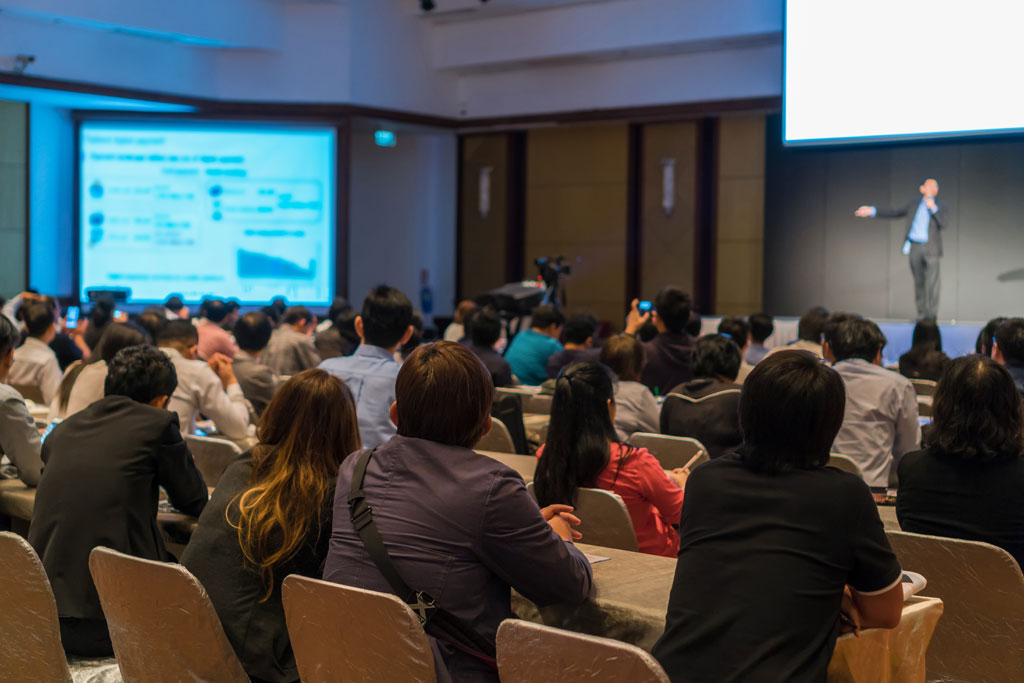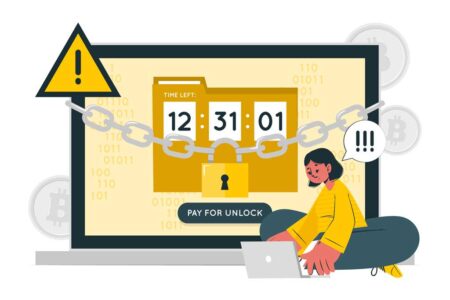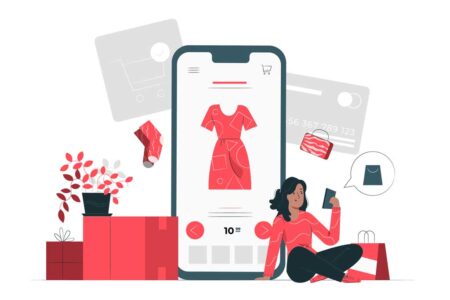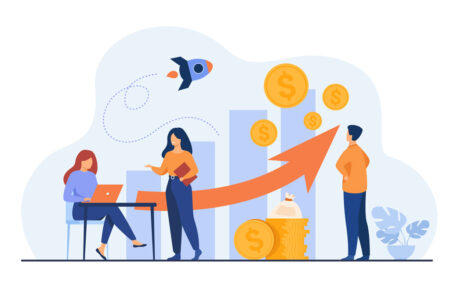Back in January, I attended the Traffic & Conversion Summit, without a doubt one of the best marketing conferences in which you will learn both tactical and strategic steps to drive more traffic to your business and create more sales.
T&C had more than 4,000 attendees, sold out months in advance, and where Digital Marketer provided live streaming for those who wanted to attend but unable to procure tickets because the event was sold out.
This was so impressive that when the opportunity came up to write about running a successful conference, I knew right away I had to interview DeAnna Rogers.
DeAnna Rogers is Director of Events for Digital Marketer (DM). She is responsible for one of the largest marketing events called Traffic & Conversion Summit, also known as T&C, along with other events such as WarRoom Mastermind, Certified Partner Program, and a new event called Content & Commerce Summit in September 2016.
Shirley Tan: How do you manage your team?
DeAnna Rogers: I have the most amazing team and feel very fortunate to have the people and that I do. Communication is the key for our high-performing team. We do daily morning meetings where we review what we need to do, and weekly meetings with additional team members to go through our checklist and ensure everything is planned. I am also a firm believer in white boards where we can map out each event, roles, responsibilities and goals.
We are also very organized and develop our execution plans a year in advance. We strategize and work from these execution plans daily. The team memorizes these plans to know each event, inside and out. Our team works well by simply planning well. From there, we just do our job.
I also believe in empowering the team. Each person is responsible for a role. I believe in them, and they have always proven that they can do it. That did not come easy for me because I was a control freak. I had to learn to let go. Once I learned to delegate and trust my team, they grew and the job was even better.
The final part of managing the team is also acknowledging the failures and “wins.” When we have failures as a team, we learn as a team, and when we have wins, we celebrate as a team. It is important that your team be rewarded for their hard work. Saying “thank you” and “I appreciate you” are not difficult, and the recognition goes a long way. When you reward the team for their hard work, they work harder and are more successful.
ST: What are the best ways to get everyone on your team involved on the same page?
DR: We conduct team meetings. I whiteboard everything. We live in our event docs and have a Standard Operating Procedure (SOP) for every event. This keeps us all on the same page. We communicate daily, including emails, team calls, or our internal Hipchat system (Atlassian) for DM. When we are all together at events, we take time out to plan for future events.
You get more done when you have that time in person, especially since my team are in remote locations between Austin and San Diego. We set the goal for each event, from registration goals to sponsorship goals, and put it on a board. When you have it in writing, you have to own it.
ST: How do you prioritize the long list of things that goes with event planning?
DR: We have an event SOP for each type of event that we do. It has the timeline and what to do at each step. For example, 90, 60, 30, 20, 10, seven, five, three days out, it outlines everything, including roles and responsibilities for each task.
ST: Do you manage by Excel spreadsheet? Do you use collaboration tools? If yes, which ones do you recommend?
DR: Believe it or not, we manage by Google Docs. I manage my SOPs by them because it is a simple, yet highly effective way to manage and collaborate. Google Docs sorts and categorize my SOPs in my folders plus my whole team can see and use them.
ST: What are your tips for sponsor/exhibitors to have great results in meeting new prospects and collecting leads? I really like the idea of the exhibitor liaison you have, how did this come about, is this common (because I never heard of it before other than the conference manager walking around and saying hi, if that even happens at all) what is the primary duty or goal to have an exhibitor liaison? What’s been the feedback from exhibitors?
DR: Last year, we started having an Exhibitor Liaison. Even though I was too busy to stop and make sure that everything was running smoothly for the exhibitors, I realized that exhibitors should be a top priority. If they have a great experience, they talk. If they have a bad experience, they talk, too. You want your exhibitors to enjoy your show and to keep coming back each year.
That’s why we created a team of three people who walk the floors and help our exhibitors. There is an exhibitor’s coordinator person who helps with managing the overall experience. I have two additional helpers that talk to the exhibitors, take them daily gifts each morning, bring them water three times a day and make sure that they are utilizing the free sponsor lounge where we have breakfast and lunch provided for them.
As far as tips for exhibitors, you need to make sure that you know going into the event all your outreach options while there. For example, does the event have a mobile app where you are listed as a vendor? Does the event have any type of game or encouragement for the attendees to visit each sponsor booth?
As an exhibitor, you should always make sure that you have something as a “give-a-way” at your booth. People stop for food or give-a-ways. Popcorn is an awesome example. The smell of popcorn lures attendees to your booth. Another great example is having a bar at your booth. Depending on the show, you can hire a bar service from the vendor/event and that will drive traffic to your booth.
You also need to show action at your booth. Don’t just sit at your booth and look at your phone. I have had someone in the past complain that there was one person who was on their phone the entire event, and was not even at their booth during the full show hours. Have a TV with a presentation going. Be in front of your booth, talking to attendees as they walk by.
Make sure that you and your team are completely available during all of the peak times of the shows. Stay late and mingle. Go to the networking events and meet the attendees. Make the booth as inviting as possible and fun to give attendees a reason why they should stop and meet you.
Overall, our feedback from exhibitors has been amazing after our events. Going into the event, we talk to our team about the importance of our sponsors and how to treat them. We want them to come back every year so the entire team knows to treat them well. I think so far we have done that and hopefully we will always continue to do that.
ST: What is the best way to work with landing speakers for the events? You guys have had amazing celebrity speakers, its not just you pay the speaker fee. I’ve noticed that the speakers are really on target with the audience, the audience really respond, what do you attribute this to. In 2015 it was Daymond John and Kevin O’Leary and this year was Gary Vaynerchuck and Verne Harnish.
DR: Our owners, Ryan Deiss and Roland Frasier work on this together. They are amazing at planning the speakers’ selection process. The key is to plan your event with your end-result in view and then plug the speakers into that vision. Never just grab a speaker because he or she is cool or famous. Just having a famous person does not inspire your attendees. Having a speaker who can offer killer content and have your attendees leaving with a new vision should always be the goal.
ST: Would you say that one of the most challenging tasks is selecting and coordinating the venue? If so, what is hard? What do event planners have to keep top of mind when tackling this task? How should they go about negotiating for room rates, block of rooms, and food cost commitment?
DR: I will say that it is in the top six.
- Staffing event
- Audio and video
- Budgeting
- Branding
- Food & Beverage
- Coordinating venue
It is very important to find and coordinate the perfect venue that matches your event. You have to plan ahead. At DM, we are booked out three years in advance so this means looking ahead and planning where we want to be, the size we want to be, and how we want the show to look years in advance in order to get big box properties.
Big hotels and convention centers are also booked out years in advance. In order to get a killer deal from the hotel or convention center, you need to plan ahead of time. The key is to have a national coordinator that can help you. I have one for the hotel chain that we use. Since we do events so frequently, I am able to leverage more concessions to help with the negotiating of terms for the event before signing the contract.
I physically go on site and visit the location and meet with the whole team. Build a relationship with the property. They give more when you are nice to them, but I also show them that I have other options and they need to give me a reason to choose their location. Let them earn your contract.
It is important to negotiate a discount for your staff rooms and to have 50% attrition built into your plan. Consider the food and beverage based on what you think you will spend, not what the hotel/convention center wants you to spend. Events are very expensive so look over the entire contract. Get hotel upgrades for your staff and speakers. Check and see if you can get a rebate on what the attendees spend on the property to be credited to your account.
Find out if the venue is part of a union before booking. If it is union, know that going into the contract and negotiate accordingly. If you choose a union property, there are a lot of restrictions and costs associated with that and can be very expensive. For example, does the property charge to handle your boxes? It is not uncommon for them to do that, so make the property waive that fee for you.
This can save you thousands of dollars, and it is easy for them to waive it. Have the property add VIP concessions to your package where you can get VIP gifts given to your speakers or you can have free concessions in your VIP lounges. Do your homework and know what all of the costs will be before signing the contract. It is easier to get everything you want before you sign than it is to ask for it later and get billed.
ST: So far questions have been very serious, but I know from attending so many events that you have done, that the events not only get the job done but the events are also very fun, from the wine tasting party to pool side party, what are your tips that can make conference not only successful but memorable?
DR: It is important that your attendees have fun. Of all the events that I have gone to, I remember the fun ones. I want people to leave our events learning and having a great time.
When you are having a good time, you tend to network more. Therefore, it is important that, as an event coordinator, you foster an environment where attendees, sponsors, and speakers can all mingle and get to know each other. It can be something as fun as using networking cards to get them to talk to each other to having bands at the receptions to having an entertainer at receptions or having an experiential time while at the event.
Other ideas include having a photographer or a photo booth or putting games on the tables as icebreakers. Even themed parties are fun. If you have a bar at the reception, then create drinks named after your event/company/speakers. Little things matter, too.
This includes branded cocktail napkins and sponsor banners at the receptions. Have flower arrangements on tables. If it is themed, go all out with the décor to create that memorable experience. Hide cash under chairs/bar tables and then have a time during the reception where people look for the money. The key is to give attendees a reason to mingle and get to know each other.
It is important, if you are planning themed or these fun receptions, to promote it to the attendees beforehand. Let them know before they arrive what fun they can expect to have while at your event.
Lastly, your staff needs to work these receptions and talk to the attendees while there. Attendees want to meet staff and sponsors. Have your team walk around and give out drink tickets or talk to the attendees. This is a great opportunity to get feedback and fix anything. Your staff should use networking events to represent your company/brand well. Include your sponsors at the receptions and have your team help make connections for them.
ST: Finally, what is the most rewarding aspect of planning a conference? Perry Belcher (co-founder) said in front of me along with Roland Frasier (partner) at the last conference “we have a DeAnna”, he is basically saying that you’re their secret weapon, what makes you roll out of bed everyday and put on 20+ events a year for DM?
DR: Honestly, you have to love what you do when you handle [more than] 20 of these type of large events every year. I love running events for Digital Marketer with my incredible team. I am thankful for this opportunity that challenges me daily. I do get tired but there is no doubt that anything worth doing is worth doing well, so we continue working hard
Events are a constant challenge. I love figuring out how to do it bigger and better every time. I am very fortunate that DM allows me to be creative. They are so incredibly supportive of our team and how we plan events. There is something so rewarding ending an event and knowing that you gave it your all and it was successful. Every event is going to have issues and it is how you and your team deal with the issues and overcome challenges.
Our events team is like a family. We travel so much together that we depend on one another. Because our events are such large-scale projects, it took [more than] 157 staff to work this year’s event. Next year we are projecting to have [more than] 210 people working the event. Therefore, as an event coordinator, it is vital that you choose your team wisely. Pick people to work with that you trust and will always have your back. When hiring staff to work events, train and hold them accountable.
I think my most favorite thing that we do is that we hire a lot of college kids to work our events. I will hire college kids from local universities before I go to a temp agency because they tend to work harder and appreciate getting the experience. I have seen several of our college kids that have worked for us get jobs with successful companies while at our events. That makes me proud that we had a hand in that. .
It is equally important that you have good management. I have the best team that manages different roles for the event: Registration Manager, Security Manager, Ballroom Manager, AV Manager, F&B Manager, Staff Manager, Reception Manager, Sponsor Liaison, VIP Manager, Speaker Manager or Staff Workroom Manager, you must have people in those roles that you trust will execute perfectly.
The best thing I ever did was get out of my own way and let my staff do what they do best. Win or fail, you have to let them do it and learn from it. I had a staff member the other day remind me of that.
At the end of the day, you have to feel fulfilled with what you do. My days are never boring. At the end of each day, I go to bed knowing that I am fulfilled and blessed. I am grateful and I never forget that.
About DeAnna Rogers
DeAnna Rogers started in the Event planning business in 2005. She had [M2] a company called Affiliate Mastermind Company. AMG was formed because she observed in the event and speaking industry that Affiliate coordinators, JV managers and event planners often operate without a clear roadmap to success.
She’s written “The Perfect Protégé” in 2011 with her business partner, Sheila Farragher-Gemma.
In the book, she gives advice, tools and support to empower affiliate coordinators, JV managers, event coordinators and beginning speakers to excel professionally.
She shares her experiences and learnings on best practices to help streamline, automate and improve the administrative functions of these positions, while providing professional growth in development, education, and networking opportunities to the professionals in them.




